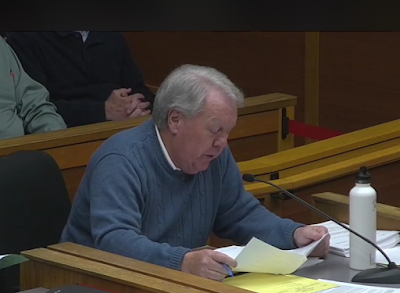By Sarah Owens and Michael Livingston
 |
| Resolution to Spend URA $ on Homeless Assistance |
To be sure, urban renewal was just one of several factors that contributed to the rise of homelessness in the latter part of the last century, but it seems entirely appropriate that a portion of the money reserved for urban renewal should be spent alleviating the suffering it causes.
So, we can all be grateful that, Monday night, the City Council, sitting as the Urban Renewal Agency Board, adopted Resolution No. 18-12 URA, approving amendments to the Riverfront-Downtown Urban Renewal Plan to add, among other things, URA Project 1110 to "address homelessness and support of the [sic] Salem Strategic Plan", and then, sitting as itself, adopted the virtually identical Resolution 2018-83. These actions will allow the City to use its urban renewal dollars to "build out" the sobering center -- and even buy the building, if it wants to.
Here are some reasons the City might want to buy the building and lease it back to the owner/occupant, the Mid Willamette Valley Community Action Agency (MWVCAA), at a favorable (substantially less than market) rate (see here, last page):
- Protect its investment against possible foreclosure. This is a real possibility, considering the financial difficulties of the owner, which purchased the building in 2017 for $2.1M using $500,000 in state homeless assistance funds with the balance seller-financed, including two balloon payments of $250,000 each, the first of which must be paid by the end of this year (see here and here).
- Lower sobering center annual operating costs. At the moment, the City-County-Salem Health partnership is short about $200,000. Assuming those costs include some amount for rent, City ownership would eliminate that cost and reduce the shortfall.
- Allow the City to fulfill several Downtown Homeless Task Force recommendations (the building has public restrooms, and, after renovations are complete, will have more restrooms, showers and laundry facilities, and could potentially provide space for storage of personal possessions).
- Ensure the City always has an emergency/inclement weather overnight shelter location available downtown.
- Free MWVCAA to use its resources for homeless assistance, instead of buying and maintaining a building.
 |
| Councilor McCoid Ward 4 at URA Bd Mtg 11/26/18 |
Yes, sobering services make general sense, in that they're a less costly way to provide a needed emergency service, but what about this project?
It would appear to make sense from a law enforcement perspective, by avoiding hospital admissions/incarceration costs.
It would appear to make sense from MWVCAA's perspective, by lowering MWVCAA's construction, maintenance and utilities costs, not to mention the monthly mortgage payments.
But what about the homeless? The City claims the sobering center is one of several programs that will be "actively helping the homeless and working to reduce homelessness", but is that true? You won't find sobering services listed anywhere with OHCS or HUD as a best, or even promising, practice. Users tend to be repeat users, versus the service being some sort of gateway to treatment or stable housing.
What about downtown businesses? Will having a sobering center allow the police to "clean up" downtown every morning, as some may hope? Chief Moore told the Public Safety Coordinating Council that the police do not remove those in need of sobering services, except on a voluntary basis (unlike CHIERS in PDX). Will people be as likely, or more so, to want to go to the sobering station than they are to the ER? Does it matter to downtown businesses where people go to sober up?
What about HRAP? The City program that is *actually* moving chronically homeless residents off the streets and into stable housing, one by one. Does it make sense to spend $200,000+ annually in General Fund dollars that might otherwise be available for HRAP on sobering services? Can we not agree it makes more sense to use those funds to help move would-be sobering service clients off the streets and into stable housing through HRAP? The practitioners we've talked to all said yes, emphatically.
The City's decision to use urban renewal funds to address homelessness is a creative means by which to address several longstanding needs downtown. Serious doubts remain, however, as to the advisability of City's sobering center project, the fact that we're poised to invest hundreds of thousands of dollars in construction notwithstanding.
Sadly, urban renewal won't save us from ourselves.

No comments:
Post a Comment